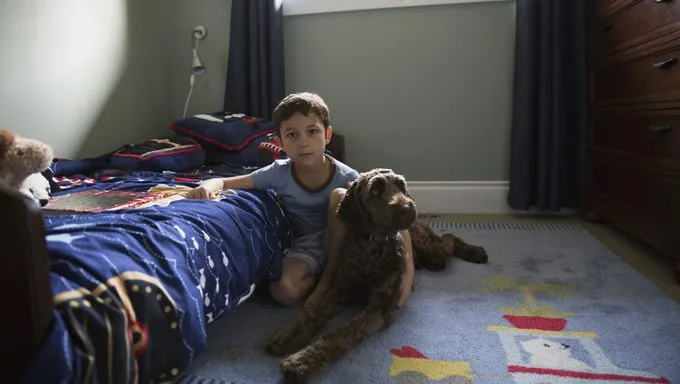The time following any shelter adoption can be critical. That’s not simply because you and your dog are getting to know each other, but because those first days and weeks are laying a foundation for your new life together.
Imagine living for days, weeks, even months in a shelter where your home is a kennel surrounded by rows of other kennels and unfamiliar, barking dogs.
You’d probably be sad and confused, especially if you were given up by your previous family. Or maybe you were living as a stray, struggling to survive on the streets. Or maybe you lived with an abusive or neglectful human.
Then one day, everything changes. Someone new comes to the shelter and takes you home. All the surroundings, the people, and perhaps other pets inside the new home are new and confusing. The routine is completely different.
Dogs who go through this process can, understandably, need time to adjust and decompress in their new homes.
You Can Help Your Dog Through The Decompressing Process
Even if a dog comes from a great shelter and enters a loving home, there’s a lot of stress associated with so much change. As the new pet parent, you should be prepared to help make the transition as comfortable and soothing as possible.
It’s going to take both time and some patience.
Dogs need a period of time to decompress and get back to a calm state of mind, and the amount of time that requires can vary with each dog. At a minimum, expect it to take at least a full week.
During that time, treat the dog with respect while giving gentle guidance, exercise – walking and playing – and bonding through quiet times together.
Stock Up & Plan Ahead

Ready your home for this new family member by having the essential supplies needed for their first week.
Designated cozy spots where the dog is allowed to rest and relax are important, and soft, comfy bedding is necessary and especially welcome for a senior dog.
The dog should have some safe spaces in the home that they can retreat to. If you reward them when they go to those areas, it will help them settle in and feel more comfortable in a strange environment.
The shelter can tell you what type of food your dog has been eating and alert you to any allergies. If you decide to change their food, do so gradually so you don’t upset their digestive system. Stock up on appropriate treats for training and rewards.
Purchase tags for the collar and decide if you want to use a microchip. Get a sturdy leash and a properly fitting harness.
Location, Location, Location
Think about where your dog will live once they come home. Will they be allowed in all of the rooms or limited to some designated areas?
Making these decisions before the big homecoming day will reduce anxiety and help you decide where to place beds, gates and barriers. You’ll probably want to keep your new dog in a crate when you’re not at home, at least until the decompression period is over and everyone is adjusted and comfortable.
This is really for the dog’s own safety and to avoid any disasters that could happen if the dog panics when you leave. Once the animal understands that you will always come back, you can decide if the pet can stay free while home alone.
Separation anxiety is very real, so practice brief absences during the initial decompression and keep goodbyes and greetings low key to help the dog adjust.
Set up the crate ahead of time. Make sure it’s the appropriate size and has comfortable bedding. A Kong or similar smart puzzle game in the crate provides both comfort and some stimulation, and will help the dog pass the time while you are away.
Remember To Be Patient

Even if your new dog is housetrained, expect some accidents. The stress of change to a new environment and the associated anxiety can lead to training lapses.
Set your dog up for success by taking them outside frequently and rewarding with lavish praise and a treat each time they eliminate outside. If you catch the dog in the act, don’t punish. Pick them up and take them outside to finish, and praise and reward then.
If you don’t catch the dog in the act, never punish them after the accident. The dog simply won’t remember or understand why they’re being punished.
If the dog does something you like and want them to continue doing in the future, lavish praise and a treat will communicate that they should do this again.
Comforting Your New Rescue
Recognize when your new rescue dog is afraid. Fear is a powerful emotion that throws training and commands out of the window.
Comforting the dog when they’re afraid doesn’t reinforce their fear as some believe. Speak in a soft voice, and stroke them gently until they calm down.
You’re probably eager to show off your new canine companion to extended family and friends, but give it some time. During the decompression period, allow the dog some time to relax and adjust before rushing them into social situations and expecting them to interact with strangers.
Meet The Family

If you have other pets, make those introductions slowly. Initially it’s best to let dogs get acquainted away from home, like on a walk or in the park. The established dogs may feel more territorial in the home.
If the animals seem to get along, let them continue their meet-and-greet in the backyard, supervised by you. When you feel comfortable – and only then – let them be together in the house.
If you have any hesitation, keep them separated indoors and repeat the outdoor meetings until they all fully adjust.
Every dog will make the transition to a new home at their own speed. It can take a shelter dog six to eight weeks or even more to fully adjust to a new home.
Don’t worry if their behavior doesn’t fall into place right away. With love and patience, it will happen.
Have you ever helped a shelter dog adjust to their new home? What advice would you give new dog parents? Let us know in the comments below!
Related Articles:









